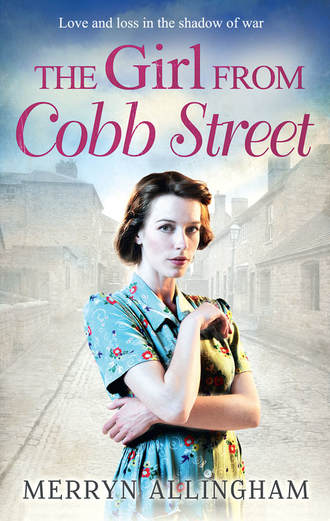
Полная версия
The Girl From Cobb Street
From the corner of her eye, she caught sight of Gerald waving at her from a nearby alleyway. She felt real gratitude that he’d managed to come, and walked towards him as swiftly as the heat allowed. The burning air was dancing ever more energetically through the bazaar and she felt drained by its onslaught. Drained, too, by the recent unwelcome reminder of what had happened on board ship. The memory was never far away and for the moment she was thoroughly shaken.
Beneath the shade of his topi, Gerald’s expression was unreadable, but his words made his feelings clear. ‘Buck up, Daisy. I’ve been waving at you for an age. I borrowed a regimental motor to come, and it has to be returned straight after lunch.’
He marched forward, leaving her to follow meekly behind. In single file they retraced their steps to the road and the waiting car. She didn’t see Grayson Harte, once more mingling with the crowd and all but invisible. Didn’t see that from beneath the awning of a nearby stall, he was watching them and watching them intently.
Their journey back to the bungalow was conducted in silence, both of them exhausted by the oppressive atmosphere of early afternoon. The once bright blue sky had turned leaden but a pewter sun was no less powerful, bouncing its rays off the topi she’d remembered to wear. She tried to blot the discomfort from her mind and concentrate instead on gathering her thoughts into some kind of order. She was looking forward to eating dinner with her husband that night. ‘Looking forward’ was perhaps optimistic; the prospect was making her apprehensive, even a little scared, but she knew she must make the attempt to clear the air between them, and very soon.
She had been in India three entire days and the conversation she’d been waiting to have remained unbroached. She would have liked the meal to be special but this morning she hadn’t felt brave enough to give Rajiv a menu. Ten to one he would pretend he didn’t understand, or the food she chose would not be available. And then Anish had arrived and taken her to the bazaar and she’d pushed the thought of the meal to the back of her mind. So whatever Rajiv chose to cook tonight would have to suffice. And the food itself was unimportant, it was what she must say to Gerald that was vital. What would she say? How would she say it? She could begin perhaps by recounting the details of her day. He wouldn’t be interested in cottons and trimmings, she knew, but it might give her the confidence she needed, the courage to speak the difficult words.
The driver swerved to a halt in front of the bungalow and Gerald said something to him in Hindi.
‘He’ll be returning at five,’ he explained. And before she could question him further, he’d strode up the front path and across the veranda, calling loudly for his servant.
‘We won’t require dinner tonight, Rajiv.’
Her heart gave a small lurch. There was to be no meal after all and the words she had been rehearsing dissolved into the sticky air.
‘Where are we eating, Gerald?’
‘At the Club. Sorry—I should have mentioned it but things have been a bit hectic at camp.’
She was tempted to ask what things. They might explain why Gerald had decided not to share her room last night, but he’d turned away from her and strolled across to the table to fill two glasses with the lemonade that Rajiv had mixed for them.
She felt an immense frustration. She needed to put things right as soon as possible and tonight had been her chance. But perhaps she could still persuade him to stay. There had been a time when he hadn’t wanted to leave her side. Very deliberately, she walked towards him and laced her arms about his neck.
‘Couldn’t we spend this evening here?’ she asked quietly, giving a little tug to pull him close. ‘We could go to the Club another night.’
‘Not possible, I’m afraid.’ He was fidgeting beneath her touch. ‘It’s all arranged—I can’t mess things up now.’
She tried to hug him tight, then stood on tiptoe and grazed his cheek with her lips, catching the corner of his mouth as she did so. ‘Surely it won’t matter if we miss one dinner,’ she persisted. ‘I’d like to stay home, Gerald. We’ve hardly spent any time together.’
‘We will,’ he said briskly, looking over her head at the wall beyond and unwrapping her arms from around his neck. ‘But tonight it’s important we go to the Club. You’ll enjoy it. It’s in the cantonment and the centre of social life on the station. There’s lots happening. Dancing, cards, billiards. And a great bar. It’s the Club dinner tonight—there’s one every week—and everyone comes. I’ll be able to introduce you around. It’s a chance for you to meet the other wives. You’ll want to do that.’
She didn’t share his certainty, but as it appeared she was destined to spend a good deal of time in their company, it might be better to get the ordeal over as soon as possible. And the Club dinner couldn’t go on for ever, she reasoned. When they returned, Rajiv would be gone and they would be alone. She would have the opportunity to open her heart. Gerald would be shocked at her news, but sympathetic, she was sure. He would soothe her with words and kisses. They would curl up in bed together and sleep in each other’s arms. She sank down on the sofa, smiling softly at the picture she’d conjured.
The cold trickle of lemonade was reviving her a little. ‘What should I wear?’ she asked.
It was an important question. She wanted to make him proud of her and if she were about to meet the women she would live among for the next few months, it was essential she look her best.
‘The dress you had in Bombay. The one with splashes of colour.’
So he had noticed. She felt her bruised soul sing just a little. Even in his disoriented state, he had noticed what she’d been wearing for their wedding. And that dress was now freshly clean and pressed and hanging in her wardrobe. Thanks to Rajiv, she thought. She must try to feel more charitably towards him.
‘You need some company,’ Gerald was saying bracingly. ‘It’s not good to be on your own too much. The mind can start playing tricks. Rajiv tells me you’ve been seeing ghosts in the garden.’
Her impulse to charity withered. It seemed that Rajiv carried every tale he could to his master, but she was not going to be coerced. ‘I did see someone,’ she said firmly. The more she’d thought about it, the more sure she’d become. ‘And it was no ghost. Unless ghosts are heavy smokers.’
‘Unlikely. Almost as unlikely as seeing a real-life trespasser at that hour. You were over-tired, Daisy, and when you saw what you thought was a figure, you could only have been half-awake.’
‘I was awake enough to be scared that I was alone,’ she retorted. ‘You were nowhere in sight.’
‘I slept in the other room—I didn’t want to disturb you—and I heard nothing.‘
It was just as she’d thought, and there was really no need for him to sound defensive. The mystery remained unexplained, but perhaps Gerald was right when he said she’d been in a dream.
He wandered to the table with the empty glasses and seemed keen to change the subject. ‘It will be good for you to get to know a few of the wives before you travel up to Simla.’
There it was again, that place. First Anish and now Gerald. ‘Anish mentioned Simla to me this morning.’
‘I hope he painted its delights for you.’
‘He praised the town highly.’ She debated whether to say more. ‘He also said I’d be going without you.’
Gerald looked taken aback. ‘Whatever made you think I’d be coming? My work is here, you must see that.’
‘And is that so for the other women? They don’t mind leaving their husbands behind?’
‘They’re only too delighted to get out of this heat. You should be too. While you’re there, you can think of me slaving away on the burning plains! In any case, I’ll visit when I can, but it’s a two-day journey and I’ll need a block of leave to get there and back.’
She sat staring ahead, lost in a solitary future. He was watching her closely and an irritated frown furrowed the smoothness of his face. ‘What’s wrong? Why on earth would you not want to go?’
‘I’ve only just arrived, Gerald, and we are only just married.’ It shouldn’t be necessary to remind him, she thought.
‘I realise that. It’s why I haven’t packed you off immediately. By the time the last group of women leave next week, you’ll have had ample space to recover from the journey.’
Was he deliberately misreading her concern? Making out that it was the travelling rather than their marriage that was worrying her. She couldn’t be certain, but she was certain she had no wish to be ‘packed off’, no matter how enticing the place. The set look on his face, though, signalled it would be difficult to refuse.
‘You’ll try to visit while I’m there?’
‘Whenever I can.’ His response mixed relief with cheerfulness. ‘But really you won’t need me. The women get all sorts of things going. Parties, picnics, concerts, amateur dramatics. Even fashion shows. And every Sunday you can wear your best clothes for morning service—the cathedral is always packed—and be certain they’ll stay crisp. The climate is wonderful.’
‘So Anish told me.’
‘He was right. The scenery is wonderful too. You can see the Himalayas through the clouds and they go on for mile after mile. Great masses of ice and snow almost hanging in the sky. It’s majestic. The gods are supposed to live in the mountains, did you know that? And when you see them for the first time, you’ll believe it.’
She smiled faintly. He was so enthusiastic and he was concerned for her. He wanted her to be happy and comfortable in her new life and that was reassuring; that was more like the old Gerald. She would do as he wished, she decided, and if she were ever tempted to waver, the thought of escaping an overpowering heat would be sure to persuade her back into line.
The driver was at the door at five o’clock sharp. She saw the pleat of his turban bend and flutter as he talked with her husband on the veranda. Gerald had warned her not to dress until the last minute and she was glad of the advice. Even though the early evening air was balmy, the warmth still bounced off the ground, hitting legs and body with unbelievable energy. Her entire skin was aflame and once the dress was on, the lightest of silks felt like a hot glove.
The Jasirapur station had so far been only a word to her but as they drove through what Gerald told her were the civil lines, she had a sense of the power and reach of the administration of which she was now a very small part. Row after row of bungalows spread before them, the homes of civil service personnel, of police and forestry officers, and their families. On the other side of the road, further lines of bungalows stretched into the distance, each whitewashed and red-ochred and separated one from the other by splashes of tired grass. This was the cantonment, her husband told her, the home of the military. Beyond the bungalows, a hotchpotch of interlinked buildings signalled the barracks for the Indian soldiers.
Daisy glanced across at her husband. He looked splendid in blue and gold, his slim, upright figure admirable in the close-fitting dress uniform. For an instant she was filled with a surge of pure pleasure. It was wonderful to be dressed so prettily, to be sitting beside the man she loved, and to be going into company for the very first time as a couple. Her heart felt lighter than it had since those heady moments in London. These last few days, she’d become wary of betraying her ignorance and swallowed most of her questions, but a new sense of wellbeing encouraged her to ask, ‘Have you always rented the bungalow or did you once live on the station?’
‘I lived in the Mess. It’s over there.’ And he pointed vaguely in the direction of the barracks. ‘It’s home to the unmarried officers. Some of the married officers too—if they want to get away from their wives. The centre of regimental life really. Everyone sleeps, eats, spends their spare time there.’
‘Then Anish must live in the Mess. Will he be coming tonight?’
It seemed important that he was. His was a kind face, she thought, kind and familiar and friendly.
‘He won’t be at the dinner. Indians aren’t allowed in the Club.’
She stared at him in astonishment. ‘It’s beginning to change but it’s still difficult,’ he said tersely. ‘Last year the Colonel put up an officer for membership, a cadet from the Indian Military Academy—the same as Anish. He was turned down, so the old boy won’t allow other Indian officers to apply.’
‘But surely …’
‘It’s the way it is, Daisy.’ His voice rose in annoyance. ‘And you better get used to it. There are all kinds of distinctions to life here and it’s important you learn them. The military and the ICS—the civil service—are on a par, top of the social tree, but planters and businessmen are not quite the thing. If you hear anyone called a box-wallah, that’s who they’re talking about. Tea and indigo planters have more status than the sugar and jute wallahs. They’re trade and aren’t allowed to join the Club either. They have their own place.’
Daisy knew all about distinctions. She had been on the wrong end of them all her short life and had had little option but to accept that was the way things were. But it didn’t mean she was ever going to think them right. And certainly not a distinction that barred a man like Anish from mixing socially with those he worked beside day after day. But she knew, too, that she was helpless in the face of conventions she imagined had held rigid for centuries, so she said no more.
CHAPTER FOUR
The Club was housed in a spacious, white building with a long, deep veranda running its full length. A sloping red roof provided shade and as much coolness as was possible. Cane tables and chairs were scattered along the veranda’s expanse and several groups of people were chatting there, heads bathed in the light that spilled from open windows and doors. Drink was flowing freely and repeated calls of ‘Koi-Hai!’ interrupted the buzz of chatter, as one or other of the Club servants was called to attend. The scratchy sound of an old record filtered through the air and Daisy felt her husband’s arm guiding her towards the sound. As they mounted the wooden steps, she felt the drinkers’ eyes swivel in their direction, their stares variously curious and indifferent. A tall woman rose from a nearby table and came towards them. She appeared to be wearing a floral dressing gown, its skirts flowing around her ankles. At second glance, Daisy could see it was an opulent evening gown, and she immediately felt underdressed.
‘Gerald, my dear, how good to see you here. And with your new bride. Such a pretty girl you’ve found!’
‘I’m glad to see you, Mrs Forester.’ He certainly looked glad, Daisy thought. Glad and relieved. ‘Daisy, this is Mrs Forester. Colonel Forester is my commanding officer.’
‘Call me Edith, my dear. It’s a great pleasure to meet you. You must let me take you in hand and introduce you to as many wives as we can manage. Gerald, get your wife a chota peg.’ She saw Daisy’s anxious expression. ‘On second thoughts, a gimlet might be better—gin and lime my dear, most refreshing.’
Daisy felt a confusing mix of emotions as they passed into the Club meeting room. It seemed she was approved by this august matron and that had to be good, but she was not at all sure she wished to be taken in hand by her. It was Gerald who should be by her side. But where was he? Making straight for the bar, she saw, along with every other man in the room. And it was an enormous edifice, its huge polished surface filling at least a quarter of the available space.
In general the clubhouse was not inviting. Its walls were wood panelled and decorated with the heads of various dead animals, interspersed here and there with sepia-tinged photographs of past company. In the middle of the central wall was a full-length portrait of the new King and Queen, looking almost as nervous as Daisy felt. At one end of the room a huddle of women were bunched tightly together, and it was towards this ocean of floral silks and flashing jewellery that she allowed herself to be gently pushed. Edith was propelling her with one hand while with the other she waved to friends on either side, as the women divided obediently at her approach. Like Moses and the Red Sea, Daisy thought.
For the first few minutes, the excited babble of female voices would have blocked out Edith’s introductions, even if Daisy’s nerves had not. ‘This is Rosemary Laughton, Daisy,’ were the first words she heard. ‘Her husband is the Adjutant.’
‘Rose, this is Lieutenant Mortimer’s new bride.’ She had a rank now, Daisy thought, she was the wife of a Lieutenant. Sister Macdonald’s stringent words came back to her: the women have no role of their own, they are simply accessories to their husbands’ lives. She noticed that Rosemary had almost bowed to Edith Forester as the Colonel’s wife and she supposed that, in turn, she should be bowing to Mrs Laughton, for it appeared that Gerald was a very junior officer.
Rosemary drew slowly on her cigarette and looked at her through the rising smoke. ‘Well, you’re a surprise, my dear.’ She seemed to absorb Daisy in a single glance. ‘We had no idea that Gerald had you tucked away somewhere—quite the contrary, in fact. It must have been love.’
Before she had time to puzzle the meaning of this, Rosemary was asking, ‘And how are you settling in?’ Her voice expressed a distinct lack of interest but Daisy tried diplomacy. ‘It’s very strange, of course, but I’m sure I shall enjoy living here.’
‘You’ll enjoy the regiment, my dear.’ Her smile was superior. ‘The cavalry are the cream of the Indian Army and they are the best of all soldiers. It’s India that’s the pits.’
The woman’s rudeness startled Daisy and pushed her to a small challenge. ‘Is that true of Simla too?’
Rosemary looked taken aback. ‘Not Simla, no. Certainly not Simla. Life is wonderful there and you’ll enjoy yourself enormously. We leave next week, and I imagine Gerald will have made arrangements for you to travel with us. You’ll need to nag your servants into action, though, or you’ll find yourself packing for them.’
Confronting this frightening memsahib had made Daisy’s heart beat too fast but now she saw the woman was simply ridiculous. How difficult was it to pack a suitcase? Of course, Rosemary Laughton couldn’t know that the girl facing her had in all probability packed more suitcases than any Indian retainer. And she must never know.
‘I don’t think that will be a problem,’ she said aloud. ‘We’ve only the one servant and I imagine Gerald will wish to keep him here.’ Leaving Rajiv behind was one delight of Simla she hadn’t considered before.
‘Only one servant! What is Gerald thinking of! What about the mali, and the jemader and a cook?’
‘It’s a very small bungalow.’ She was once more driven into defending Gerald’s housekeeping. It was becoming a habit. And what on earth was a mali and a jemader? ‘Rajiv does all the cleaning and the cooking.’
Rosemary snorted. ‘I shall speak to Gerald. It’s quite ludicrous.’
The conversation had reached a dead end and Daisy was unsure how to restart it. Did these women talk about nothing other than their servants? Rescue appeared in the shape of Edith who returned to her side at that moment and whisked her away from the terrifying Rosemary.
‘It will be good for you to meet some young women of your own age,’ Edith enthused, her long skirts swishing in tune with a powerful stride. ‘Amelia Simmonds married only last year and you’re sure to have a lot to talk about.’
They arrived in front of a thin, young woman who had been lingering uncertainly on the edge of the group. Even in the dim light of the clubhouse, the vivid fuchsia of her tea gown was startlingly at odds with the pale, pinched face above.
‘Daisy is Lieutenant Mortimer’s wife, Amelia,’ was all Edith offered, before marching away to join an exclamatory group of women gathered beneath the head of a particularly morose gazelle. Daisy was left to smile hopefully at the new introduction.
‘My husband has just been made Captain,’ Amelia said proudly.
There wasn’t much you could say to that, Daisy thought, and retreated to the old, trite question, ‘And how are you enjoying India?’
‘I love it.’ Amelia gushed enthusiasm. ‘So will you, particularly when we get up to the hills. Such fun! So you’re Gerald’s wife … I’m so pleased to meet you … I’d thought that Gerald …’ Her voice tailed off and then she repeated a little desperately, ‘I’m so pleased to meet you. It can get a bit dull here to be honest, a bit claustrophobic. Same old clubhouse, same old activities. Of course, it’s far too hot to do anything much at this time of the year.’
‘I can imagine. I’ve found even reading to be a chore. But that’s probably because I’ve had nothing very interesting to read. Is there a library in the cantonment?’
Amelia looked blank. ‘Books,’ Daisy prompted.
‘Oh yes, there are books. There’s an annexe somewhere around the back of the clubhouse, I believe. I’ve never been there myself. There are plenty of magazines hanging around the Club itself, oh and catalogues from the Army and Navy.’ She paused looking doubtfully at her new acquaintance. ‘You’re not a blue stocking, are you?’
‘I enjoy reading,’ Daisy said simply.
She had never thought herself in any way clever. Gerald was clever, he had been to public school so he must be. Grayson Harte was clever. He’d talked to her of Indian history, Indian culture, and he knew all kinds of languages. That was clever in a way she was not. But neither was she as shockingly ignorant as these women appeared to be. Eden House had given her a decent grounding and Helena Maddox had continued her education, even though she’d been a servant in the house. And it had gone well beyond books. Miss Maddox had taught her to walk and talk in a genteel fashion; to appear as much of a lady, she thought proudly, as any of the women in this room.
‘So what do the wives do all day?’
‘Do?’ Amelia shook her head slightly as though this was an extraordinary question. ‘Oversee the house, I suppose, organise the servants. Give cook the menu for the day, that sort of thing. Sometimes we have coffee together.’
‘That’s not likely to take up much time.’ Daisy was regretful. She had genuinely wished for a clue as to how to fill her days, but Amelia was now staring at her as though she were a species she had never before encountered.
‘I’m not used to being idle,’ Daisy tried to explain.
Amelia considered the matter. ‘I believe some women have become nurses or teachers, but only for a short while—to fill a gap maybe.’ She moved closer and put her lips to Daisy’s ear. ‘If you want to be accepted, you had better stick to the house, that’s my advice. The senior wives would hate the idea of you working.’
‘The senior wives?’
Amelia looked around to make sure they were not being overheard. ‘The Colonel’s wife in particular,’ she whispered, ‘but also the wives of all the senior officers. They run the show, you’ll soon find out. And as wives of junior officers, you learn to let them. They wouldn’t approve of you working.’
Daisy bristled inwardly but kept her voice even. ‘What else might they not approve?’
‘I’m making them sound horrid when they’re not. They’re very nice—really, they are. They’re just keen on all the women fitting in and, as long as you do, there’s no problem. You’ll find the regiment is very close-knit, like a family. Everyone has an opinion so you have to be careful not to upset people. With the way you dress, for instance, or the friends you make.’
‘And who shouldn’t I have as a friend?’ Daisy asked. But even as she posed the question, she knew the answer.
‘Indians for one thing. And Anglo-Indians too. Some of them are nearly white so you have to be careful.’ The whisper deepened. ‘They’re not people we mix with, not now at least. It used to be different once, I think. But now too many lower class British have married women from the bazaar, that kind of thing, and we don’t recognise them.’






